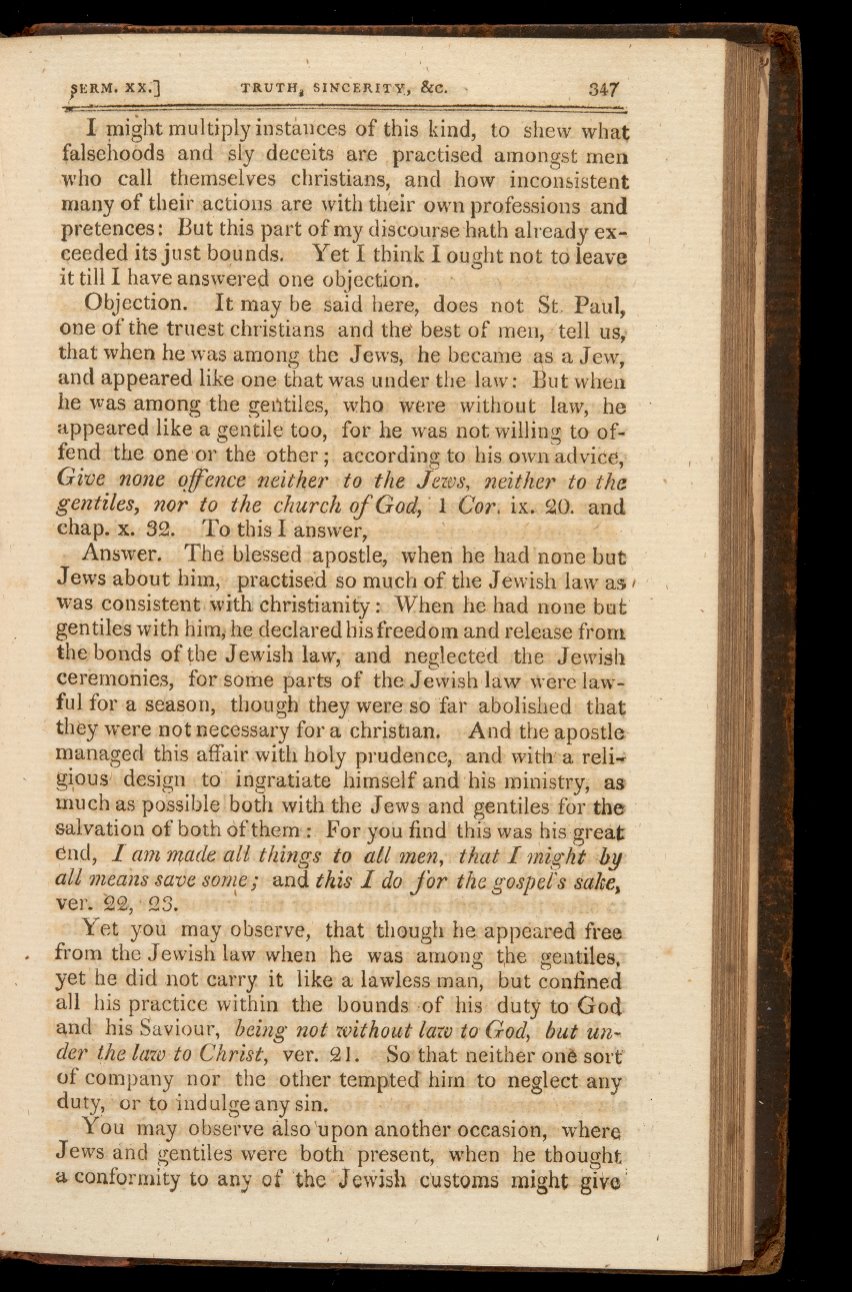

pRM.
XX.]
TRUTH,
SINCERITY,,
&C.
347
I
might multiply instances
of
this
kind,
to
spew
what
falsehoods and
sly
deceits are
practised amongst
men
who call themselves
christians,
and
how
inconsistent
many
of
their
;actions
are
with
their
own professions
and
pretences: But
this
part of
my
discourse
hath already
ex-
ceeded
its
just
bounds.
Yet
I
think
I
ought not
to leave
it
till
I
have
answered one objection.
Objection.
It
may
be
said
here,
does
not
St.
Paul,
one
of
the
truest
christians and
the
best
of
men,
tell
usi
that
when he
was
among
the
Jews, he became
as
a Jew,
and appeared
like
one
that
was
under
the law:
But
when
he
was
among the gentiles,
who were
without
law,
he
appeared
like
a gentile
too,
for
he
was
not
willing
to
of-
fend
the one or the
other;
according
to
his
own
advice,
Give
none
offence
neither
to
the
Jews,
neither
to
the
gentiles,
nor
to
the church
of
God,"
1
Cor.
ix. 20.
and
chap.
x. 32.
To
this
I
answer,
Answer.
The
blessed
apostle, when
he
had none
but
Jews about
him,
practised
so
much
of
the
Jewish
law
as
was
consistent. with christianity
When
he had
none
but
gentiles
with
him;
he
declared
his
freedom and release from
the bonds
of
the
Jewish
law,
and
neglected
the
Jewish
ceremonies, for
some
parts
of
the Jewish law
were law-
ful for
a
season, though they were
so
far abolished
that
they
were
not
necessary for
a
christran. And the
apostle
managed
this affair with holy
prudence, and
with
a
reli-
gious,
design
to
ingratiate himself and
his
ministry,
as
much
as
possible
both
with
the Jews and gentiles
for
the
salvation of both
of
them
:
For
you
find
this
was his
great
end,
I
am made
all
things
to
all
men,
that
I
Knight
by
all
naeaias
save some;
and this
I
do
for
the
gospel's
salce,
ver.
22, 23.
Yet
you
may observe,
that
though
he
appeared
free
from
the
Jewish
law when he was
among the gentiles,
yet
he
did
not
carry
it
like
a
lawless man,
but
confined
all
his
practice
within
the bounds
of
his
duty
to
God
and
his Saviour, being
not without
law
to God,
but
un-
der
the law
to
Christ,
ver.
2
I. So
that
neither one
sort
of
company
nor
the other
tempted
hirn
to
neglect any
duty,
or
to
indulge
any
sin.
You
may
observe also 'upon
another
occasion, where
Jews
and gentiles were
both present,
when
he
thought
a
conformity
to any
of
the
'Jewish
customs might give

















